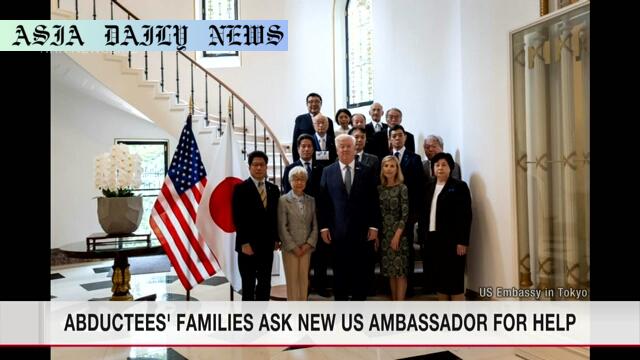Abductees: Families of Japanese nationals abducted by North Korea met with U.S. Ambassador George Glass seeking action on this longstanding issue.
Families of Japanese abductees met with U.S. ambassador George Glass for support.
89-year-old Yokota Sakie highlighted urgency as families await answers from decades-old events.
Former abductee Hitomi Soga expressed hope for her mother’s return at age 93.
Japanese officials have identified 17 abductees, with 12 still unaccounted for.

The Families’ Heartfelt Plea
In a moving and emotional meeting, families of Japanese nationals abducted by North Korea came together with George Glass, the recently appointed U.S. Ambassador to Japan. This meeting represents a critical step in drawing attention to an issue that has remained unresolved for over five decades. The families shared their painful stories, voicing their desperation for immediate action as time is running out for surviving relatives, particularly the elderly parents of abductees who have waited decades for answers.
Among the attendees was 89-year-old Yokota Sakie, whose daughter Megumi was abducted at the tender age of 13. She stands as a symbol of both resilience and heartache for families in similar situations. Now the only surviving parent among these families, her plea carries a heavy sense of urgency. Ambassador Glass, visibly moved by their stories, expressed his sorrow and attentively listened to what the families had to say during the hour-long closed-door meeting.
The Long-Standing Crisis
The issue of Japanese nationals being abducted by North Korea spans back to the 1970s and 1980s, with the Japanese government identifying 17 individuals as victims. While 5 of these abductees were able to return home following a bilateral agreement between Japan and North Korea in 2002, the remaining 12 remain unaccounted for. The prolonged silence and lack of answers have added to the grief of the families, who are desperate for progress.
The families shared their frustrations about the lack of significant advancements since 2002. Yokota Takuya, the younger brother of Megumi Yokota, openly appealed to Ambassador Glass, stating that no abductee has returned to Japan since the agreement. He emphasized the need for swift and decisive international support, particularly from the U.S., in resolving this humanitarian crisis.
Stories of Hope and Loss
One of the most poignant moments came from former abductee Hitomi Soga, who was repatriated in 2002. She shared her personal story of being reunited with her family but also spoke of the continuing sorrow for her mother, who was abducted alongside her and remains unreturned at the age of 93. Soga’s perspective not only highlights the complex emotions surrounding these cases but also adds a human face to the broader narrative of loss and hope.
The families have made it clear that they are yearning for collaboration between Japan and the United States, seeking a resolution to the abductions that have torn lives apart. Yokota Sakie eloquently summarized this sentiment, stating her hope for a joint effort that could finally bring an end to this decades-long tragedy.
The Path Forward
With the meeting concluded, the ball now lies in the court of the U.S. and Japanese governments. Ambassador Glass has indicated a willingness to engage, but the families’ demands will require international collaboration and a renewed sense of urgency. Given the geopolitical tensions with North Korea, achieving meaningful progress will be no easy task, but the families remain hopeful that fresh dialogue and diplomatic efforts can bear fruit.
The testimonies shared in this meeting serve as a reminder of the power of human resilience and the pressing need for action in long-unresolved humanitarian crises. Each day that passes without answers is another day of lingering pain for the families still waiting to be reunited with their loved ones.
Commentary
Addressing a Long-Standing Tragedy
The ongoing struggle of Japanese families seeking the return of their loved ones abducted by North Korea is a heartbreaking reminder of the human cost of political conflicts. For decades, families have lived in a state of limbo, yearning for answers and reunion. The recent meeting with Ambassador George Glass has reignited hope, showcasing the power of international cooperation in tackling such issues. However, it also underlines the urgency of time, given the advancing age of surviving family members.
The Emotional Weight of Advocacy
It is profoundly moving to see individuals like Yokota Sakie and Yokota Takuya advocate tirelessly for justice despite decades of loss and uncertainty. Their courage and determination set an example for societies worldwide about the importance of persistence in the face of adversity. It is particularly poignant to hear from former abductees like Hitomi Soga, whose mixed experiences of reunion and continued separation highlight the complexity of the situation. Every story shared serves not only as a call for action but also as a testament to the resilience of the human spirit.
Hope Amid Geopolitical Challenges
While the meeting represents a step forward, it is clear that achieving tangible results will require navigating a complex geopolitical landscape. North Korea’s often opaque political dealings and strained relations with the global community present significant hurdles. However, collaboration between Japan and the United States could bring renewed attention and strategic focus to the issue. International solidarity in cases like this is essential, not just for solving immediate crises but for affirming collective humanitarian values.
Ultimately, the plight of these families should serve as a wake-up call. With cooperation, resources, and determination, it is possible to bring closure to long-standing humanitarian tragedies. For the families, time is of the essence; the world cannot afford to let them wait any longer.


